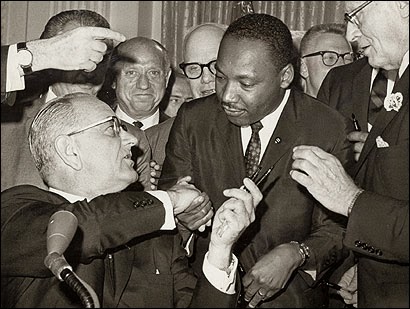This is the 50th anniversary of the Civil Rights Act of 1964. In case you are wondering what this law means to you today, this is the law that finally made it illegal for any business, movie theater, hotel, or any other establishment open to the public to refuse service to people on the basis of race. It also prevented businesses from being able to fire or refuse to promote people on the basis of race. Prior to this law, Jim Crow segregation was literally the law in many states (primarily in the South). It's hard for us to imagine this today, but 50 years ago somebody who looked like me would literally not be allowed to shop in certain stores, eat at certain lunch counters, stay at certain hotels or watch the latest movie at certain movie theaters. All because of the color of my skin. That was America.
The Civil Rights Act put an end to that and let America turn the page on state-sanctioned racial discrimination. But it wasn't an easy victory. To quote an earlier piece that we wrote on this issue:
So my question to the readers is this: given our political environment today, would today's Congress pass the Civil Rights Act of 1964? Why or Why Not?
The Civil Rights Act put an end to that and let America turn the page on state-sanctioned racial discrimination. But it wasn't an easy victory. To quote an earlier piece that we wrote on this issue:
Congress, which was controlled by the Democrats, could no longer sit back and let the Dixiecrats run the show. Not this time. There was too much pressure from the American people. It was finally time to produce some results and pass the President's bill. Even after the assassination of JFK on Nov. 22, 1963, Democratic Vice President, Lyndon B. Johnson, was sworn in as President and continued to keep the pressure on Congress to pass the bill. Finally, after much heated debate and a 57-day filibuster by the Dixiecrats in the Senate, on July 2, 1964, the bill was signed into law. It passed the House by a vote of 290 to 130 (of the 290 Yea votes - 152 were Democrats, 138 were Republicans). It passed in the Senate by a vote of 73 to 27 (of the 73 Yea votes - 46 were Democrats, 27 were Republicans). In the House there were 94 Dixiecrats - 87 of them voted against the Civil Rights Act. In the Senate there were 21 Dixiecrats - 20 of them voted against it.
